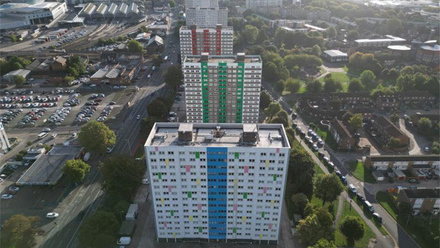New world-wide fire safety standard launched
A global coalition of over 80 fire safety leadership organisations, including CIAT, has launched a new internationally consistent approach to the safety and management of buildings, with the aim of saving more lives by reducing risk and preventing devastating fires.
The launch of the International Fire Safety Standard - Common Principles (IFSS-CP) follows extensive work to bring public confidence around the regulation and control of fire safety measures. It will be published as a UN ECE standard.
Three Chartered Architectural Technologists were selected to join the Standards Expert Panel and Writing Committee for this new venture; Professor Sam Allwinkle PPBIAT MCIAT, Dr Graham Smith MCIAT and Frances Peacock MCIAT.
Professor Sam Allwinkle PPBIAT MCIAT, said: "I am pleased to report that following the establishment of the International Fire Safety Standards (IFSS) Coalition there has been significant progress with the development of international fire safety standards and the development of common principles that can be used globally irrespective of location and legal jurisdiction.
"Furthermore, it is excellent news from UN, Geneva that The International Fire Safety Standards: Common Principles: “Safe Buildings Save Lives” document was approved by the UN council and unanimously endorsed as a global standard on 13 November 2020. As a UN ECE Standard, representatives of national and local governments and stakeholders are invited to apply the common principles to promote the safety of buildings."
He added: The three Chartered Architectural Technologists selected to join the Standards Expert Panel is a clear indicator of the particular skills Architectural Technology professionals can bring to this vitally important work.”
Following the Grenfell Tower fire, there have been numerous initiatives and workshops. The IFSS is a large group of regulators, institutions and bodies from across the world coming together to bring about universal and consistent fire safety for our shared built environment globally.
Gary Strong, Chair of the IFSS Coalition, said: "Our coalition has worked hard to produce this globally applicable way to bring consistency in fire safety to buildings new and old, and to reduce the risk to lives.
"This new standard is unprecedented, being the first agreement on fire safety principles on this international scale, with its development supported by the United Nations in line with its own sustainable development goals. It is the outcome of two years of work and worldwide expertise on fire safety from over 80 coalition organisations and will bring reassurance that the construction and management of buildings upholds appropriate fire safety standards."
The standard delivers a clear performance-based framework and common principles that applies to all stages of a building's life cycle (from design, construction, in use, to change and eventual demolition). It is highly performance-based and is not intended to replace the prescriptive standards related to fire and life safety that are already adopted and successfully implemented in countries throughout the world.
Rather, the IFSS has identified the five common principles related to achieving fire safety, which are large, high-level concepts, meant to be used as a cross-check by jurisdictions with well-developed fire and life safety standards and a starting point for jurisdictions with little to no fire and life safety framework.
- Prevention – Safeguarding against the outbreak of fire and/or limiting its effects.
- Detection and communication – Investigating and discovering of fire followed by informing occupants and the fire service.
- Occupant protection – Facilitating occupant avoidance of and escape from the effects of fire.
- Containment – Limiting of fire and all its consequences to as small an area as possible.
- Extinguishment – Suppressing of fire and protecting of the surrounding environment.
Read more about the five principles in this article by Judy Zakreski for the International Code Council's Building Safety Journal.
For latest updates, please visit ifss-coalition.org/






